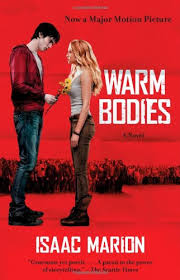
My friend doesn't understand the concept behind the book Warm Bodies, written by Isaac Marion. "Oh. It's another Zombie book," She says, although she has not read it. But it isn't.
It's an idea book, sure: a zombie falls in love with a human. But it's about more than that. It's about a world already suffering, a world of chaos where zombies have neither thoughts nor memories, and humans cage themselves together and both sides kill.
It's about moving from a horrific state of non-feeling and apathy, into a world of living. On analysis, it's a story about a people who forced themselves into becoming beings of the undead by not caring about each other.
But that still isn't this story. This story is about hope. Is Zombie-world the end? Is a zombie really thoughtless and incapable of life or death? Is a corporate president just as thoughtless?
What makes Warm Bodies different from all the other zombie books that I have read (and shows that I have seen) is that it begins in darkness and moves into a place more than stale survival. (In the Forest of Hands and Teeth is a popular YA book turned trilogy documenting the devastating life of a main character as she and friends run from zombies trying to find a place untouched by the undead. It is a good story, but morbidly depressing.) Marion could have made this book funny, a joke about the idea of zombies like the Jane Austen zombie books seem to be, but he didn't. The writing is elegant, specific, complicated. The story contains love and contemplation, contemplation the thing that keeps us guessing, the love situation seemingly impossible between the living and the undead.
Although the background facts are there--few humans have survived, zombies are crawling everywhere, the world is an isolated island--one zombie at least, and maybe others, still thinks in words, and wonders what other zombies think about. He misses his old life, and wishes he could remember his name. The zombies have their own apathetic community (much like many of our cities) and are not necessarily mere mindless drones.
R--the main zombie--thinks that they feed on human brains for a reason, that becoming a zombie has made them emotionless and with no memories or words, but eating brains gives them some emotions and memories. They hunger for that which they cannot remember, that which they miss. Humanity. This is a story not about killing off everyone else so the chosen few may survive (think The Road and The Walking Dead), but about people coming together to help one another live. It's a story not about life after death, but instead, rising from apathy.
It's an idea book, sure: a zombie falls in love with a human. But it's about more than that. It's about a world already suffering, a world of chaos where zombies have neither thoughts nor memories, and humans cage themselves together and both sides kill.
It's about moving from a horrific state of non-feeling and apathy, into a world of living. On analysis, it's a story about a people who forced themselves into becoming beings of the undead by not caring about each other.
But that still isn't this story. This story is about hope. Is Zombie-world the end? Is a zombie really thoughtless and incapable of life or death? Is a corporate president just as thoughtless?
What makes Warm Bodies different from all the other zombie books that I have read (and shows that I have seen) is that it begins in darkness and moves into a place more than stale survival. (In the Forest of Hands and Teeth is a popular YA book turned trilogy documenting the devastating life of a main character as she and friends run from zombies trying to find a place untouched by the undead. It is a good story, but morbidly depressing.) Marion could have made this book funny, a joke about the idea of zombies like the Jane Austen zombie books seem to be, but he didn't. The writing is elegant, specific, complicated. The story contains love and contemplation, contemplation the thing that keeps us guessing, the love situation seemingly impossible between the living and the undead.
Although the background facts are there--few humans have survived, zombies are crawling everywhere, the world is an isolated island--one zombie at least, and maybe others, still thinks in words, and wonders what other zombies think about. He misses his old life, and wishes he could remember his name. The zombies have their own apathetic community (much like many of our cities) and are not necessarily mere mindless drones.
R--the main zombie--thinks that they feed on human brains for a reason, that becoming a zombie has made them emotionless and with no memories or words, but eating brains gives them some emotions and memories. They hunger for that which they cannot remember, that which they miss. Humanity. This is a story not about killing off everyone else so the chosen few may survive (think The Road and The Walking Dead), but about people coming together to help one another live. It's a story not about life after death, but instead, rising from apathy.
 RSS Feed
RSS Feed
